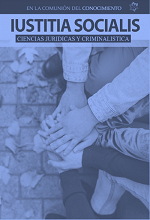The deontological projection of the sponsoring lawyer in the criminal proceedings
DOI:
https://doi.org/10.35381/racji.v5i3.1120Keywords:
Deontology, public Law, professional status.Abstract
Based on the solid deontological, ethical and professional training that the lawyer must have to fulfill his mission during the legal process, the following investigation is presented, whose objective is to analyze from a critical, legal and doctrinal sense, how the sponsoring lawyer should be projected from the deontological, ethical and professional in practice within the criminal process. From the quantitative perspective and the method of documentary analysis, to base the research based on different documentary sources, the technique for this purpose was the analysis of bibliographic content. As part of the population sample, generating results consistent with the proposed objective. Ten free practice lawyers who have handled criminal matters were surveyed, for which a questionnaire was prepared. It is concluded that, at present, the practice of law in Ecuador faces a state of mistrust that in one way or another undermines the honesty and prestige of the profession.
Downloads
References
Asamblea Nacional Constituyente de la República del Ecuador, (2008). Constitución de la República del Ecuador. Montecristi. Registro Oficial 449 de 20-oct-2008. Recuperado de https://n9.cl/sia
Asamblea Nacional de la República del Ecuador. (2014). Código Orgánico Integral Penal [Comprehensive Organic Criminal Code]. Recuperado de https://n9.cl/g6sc
Bravo-Andrade J., Narváez-Zurita C., Erazo-Álvarez J., & Pozo-Cabrera, E (2020) Vulneración del principio de contradicción para abogados ciegos en audiencias del sistema procesal ecuatoriano. [Violation of the principle of contradiction for blind lawyers in hearings in the Ecuadorian procedural system] IUSTITIA SOCIALIS.5(2),221-235. http://dx.doi.org/10.35381/racji.v5i2.743
Castro-Pizarro, J., Masache-Romero, C. & Duran-Ocampo, A. (2007) La aplicación del Derecho Público en el Ecuador [The application of Public Law in Ecuador]. Universidad y Sociedad,11(4),350-360. http://orcid.org/0000-0003-0111-0669
Lopera-Echavarría, J, & Ramírez-Gómez, C, & Zuluaga-Aristazábal, M, & Ortiz-Vanegas, J. (2010). El método analítico como método natural. Nómadas. [Critical Journal of Social and Juridical Sciences], 25(1).
Matus-Acuña, Jean Pierre. (2007). Control Ético y Deontología. [ Ethical Control and Ethics] Ius et Praxis, 13(1), 463-472. https://dx.doi.org/10.4067/S0718-00122007000100016
Merlano-Sierra, J. (2010) La responsabilidad jurídica de abogados y administradores de justicia en el Derecho colombiano [Lawyer’s professional liability and administrators of justicie in colombian law].Revista de Derecho. 33,96-120. Reuperado de: http://www.scielo.org.co/pdf/dere/n33/n33a05.pdf
Pirona, J., Gutiérrez-Curiel, J., & Isea, J. (2019). Nueva visión ética en la gestión universitaria. Una mirada desde la complejidad. [ New ethical visión in university management. A look from compliance]. KOINONIA 4(8), 54-79. http://dx.doi.org/10.35381/r.k.v4i8.272
Rodríguez Camacho, M. (2018). La defensa penal eficaz como garantía del debido proceso en Ecuador. [Effective criminal defense as a guarantee of due process in Ecuador] Universidad y Sociedad, 10(1), 33-40. Recuperado de http://rus.ucf.edu.cu/index.php/rus
Santana-Ramos, E. (2018). El rol del abogado ante la ética y el ejercicio profesional. [The role of lawyer suede ethics and professional practice]. Revista de la Facultad de Derecho. 44, 1-28. http://dx.doi.org/10.22187/rfd2018n44a5
Published
How to Cite
Issue
Section
License
CC BY-NC-SA : Esta licencia permite a los reutilizadores distribuir, remezclar, adaptar y construir sobre el material en cualquier medio o formato solo con fines no comerciales, y solo siempre y cuando se dé la atribución al creador. Si remezcla, adapta o construye sobre el material, debe licenciar el material modificado bajo términos idénticos.
OAI-PMH URL: https://fundacionkoinonia.com.ve/ojs/index.php/Iustitia_Socialis/oai










